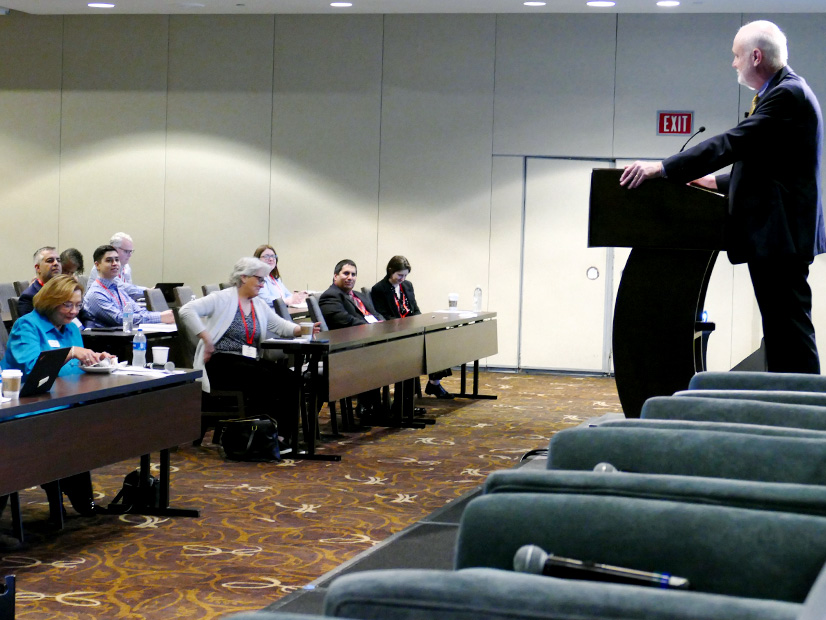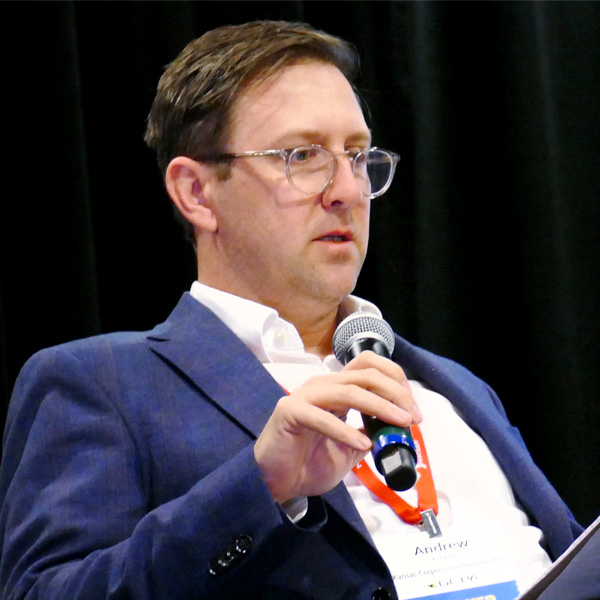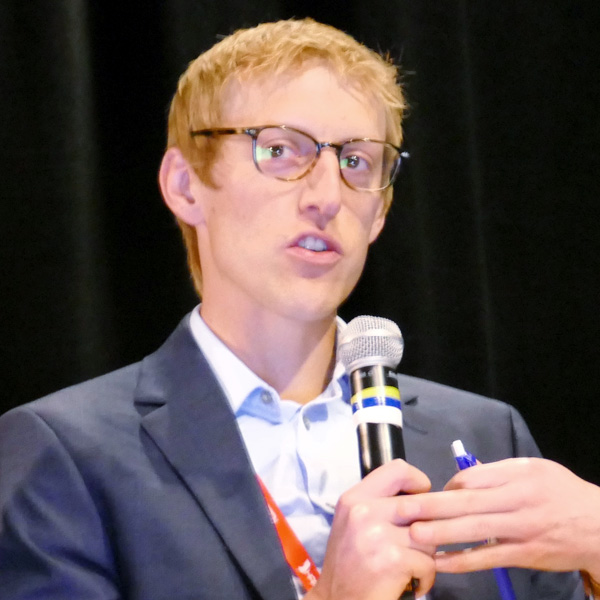
NEW ORLEANS — FERC Commissioner Mark Christie brought his message of grid reliability to the Crescent City on March 4, near the site of what he says is the best college football atmosphere in the country: LSU’s Tiger Stadium at night.
“When the sun goes down, that Tiger Stadium is a rocking environment,” Christie said. Hands down, he said, it beats the atmosphere at Alabama, Michigan, Notre Dame, Southern California and Texas.
Dispensing with pleasantries, Christie tended to the business at hand with his keynote address to the Gulf Coast Power Association’s MISO–SPP Forum.
“In America, we’re heading for a very dark place. We’re heading, as Franklin Roosevelt said, to a rendezvous with destiny,” he said. “Well, we’re heading, in terms of the reliability of our power grid, for a rendezvous with reality. And you can’t escape reality because ultimately, reality will track you down. And reality is tracking us down and we need an honest conversation about why we’re heading for a reliability crisis.”
Christie has been making the rounds with his warning that dark times — figuratively and literally — lie ahead for the nation.
Last May, he told the U.S. Senate’s Energy and Natural Resources (ENR) Committee that the grid is facing “potentially catastrophic consequences.” During an SPP forum on resource adequacy in September, he ran through a list of capacity shortfalls that grid operators are expecting and explained his use of the adjective “catastrophic.” (“Multiple-day outages [are] … catastrophic by any definition.”) (See Senators Praise Phillips, FERC’s Output at Oversight Hearing, Nation’s Grid Faces ‘Rendezvous with Reality’.)
“It’s arithmetic. We are subtracting dispatchable resources at a pace that’s not sustainable, and we can’t build dispatchable resources to replace the dispatchable resources we’re shutting down,” he said.
Christie said the problem is not necessarily the massive additions of intermittent wind and solar resources in many parts of the country, but rather the pace of thermal resources’ retirement.
“We’re pushing [dispatchable resources] off the grid far too quickly for any replacement resources to take up the slack,” he said. “That’s why we’re heading for crisis. Its simple subtraction.”
He bolstered his case by linking George Orwell and Vladimir Lenin to fellow revolutionaries MISO’s John Bear and NERC’s Jim Robb.
Bear and Robb?
“If you’ve ever met John Bear, he doesn’t look like a revolutionary. If you’ve ever met Jim Robb, he doesn’t look like a revolutionary,” Christie said. Referencing a quote often attributed to Orwell — “In a time of deceit, telling the truth is a revolutionary act.” He said the two CEOs are performing revolutionary acts.
“Because why? Because they’re telling the truth,” Christie explained. “They’re telling the truth, that we are forcing dispatchable resources off the grid at a pace that simply is unsustainable, and it is going to affect our reliability.”
Robb told the Senate ENR Committee in June that the grid’s increasing reliance on renewable resources as baseline resources retire will likely lead to “more frequent and more serious disruptions.” In MISO’s latest Reliability Imperative report released in February, Bear called for facing “some hard realities” because of “immediate and serious challenges” to the region’s grid reliability. (See Robb Warns of ‘Serious Disruptions’ from Grid Transition, MISO Publishes Call to Action to Bypass Danger in Reliability Imperative Report.)
“What to do? Well, this didn’t come from Lenin, but it comes from where I grew up in West Virginia,” Christie said. “It’s called the first rule of holes, and the first rule of holes is when you’re in one, stop digging. So, if we’re digging a hole deeper because we’re shutting down dispatchable resources at a pace we can’t sustain, let’s stop doing it.”
Christie’s remarks were received positively by several regulators in the audience.
Andrew French, chair of the Kansas Corporation Commission with a background in environmental science, said he couldn’t disagree with anything Christie said.
“I’m an environmentalist. I come from a perspective of wanting to transition as much clean energy onto the grid as we can,” French told RTO Insider. “But, also, as a state regulator that is obviously concerned about both cost and absolutely reliability, I can’t really disagree with anything.
“As Commissioner Christie has said before, it’s not the addition of [renewable] resources that’s the problem. It’s the subtraction of the attributes associated with some of the traditional resources that is the issue. That is the issue we have to solve,” he added.
Marcus Hawkins, executive director of the Organization of MISO States and jaded by years of projected shortfalls that failed to materialize, shared a more nuanced perspective of Christie’s comments.
“In MISO-land, we have a ‘boy who cried wolf’ problem” with projected shortfalls, he said. Hawkins noted OMS surveys over the past decade of the RTO’s members have consistently found shortfalls three or four years out.
“It’s different this time. There’s load growth that’s complicating this. You need context. You can’t just go and say, “Eight gigawatts short in 2028,’ because that’s been the story since 2015,” he said.
Hawkins said he agreed with Christie’s comments that MISO states with vertically integrated utilities give regulators a lot of power to address reliability issues.
“That’s what we’ve seen these last 10 years. We’ve had the gaps projected and you see the regulators work with their utilities and fill that gap,” he said. “I think we’re in a great position to continue to do that and MISO is providing more useful information to the regulators to make decisions, and that’s helpful.”
Christie urged those listening to repeat the actions taken by Bear and others sounding the alarm on energy shortfalls.
“You have got to be brutally honest with your state regulators, your federal regulators and policymakers about the direction that we’re heading in and the rendezvous with reality that we’re facing,” he said. “If our power supply doesn’t keep up with load, it goes out. That’s not an engineering marvel. That’s just the way it works.”





